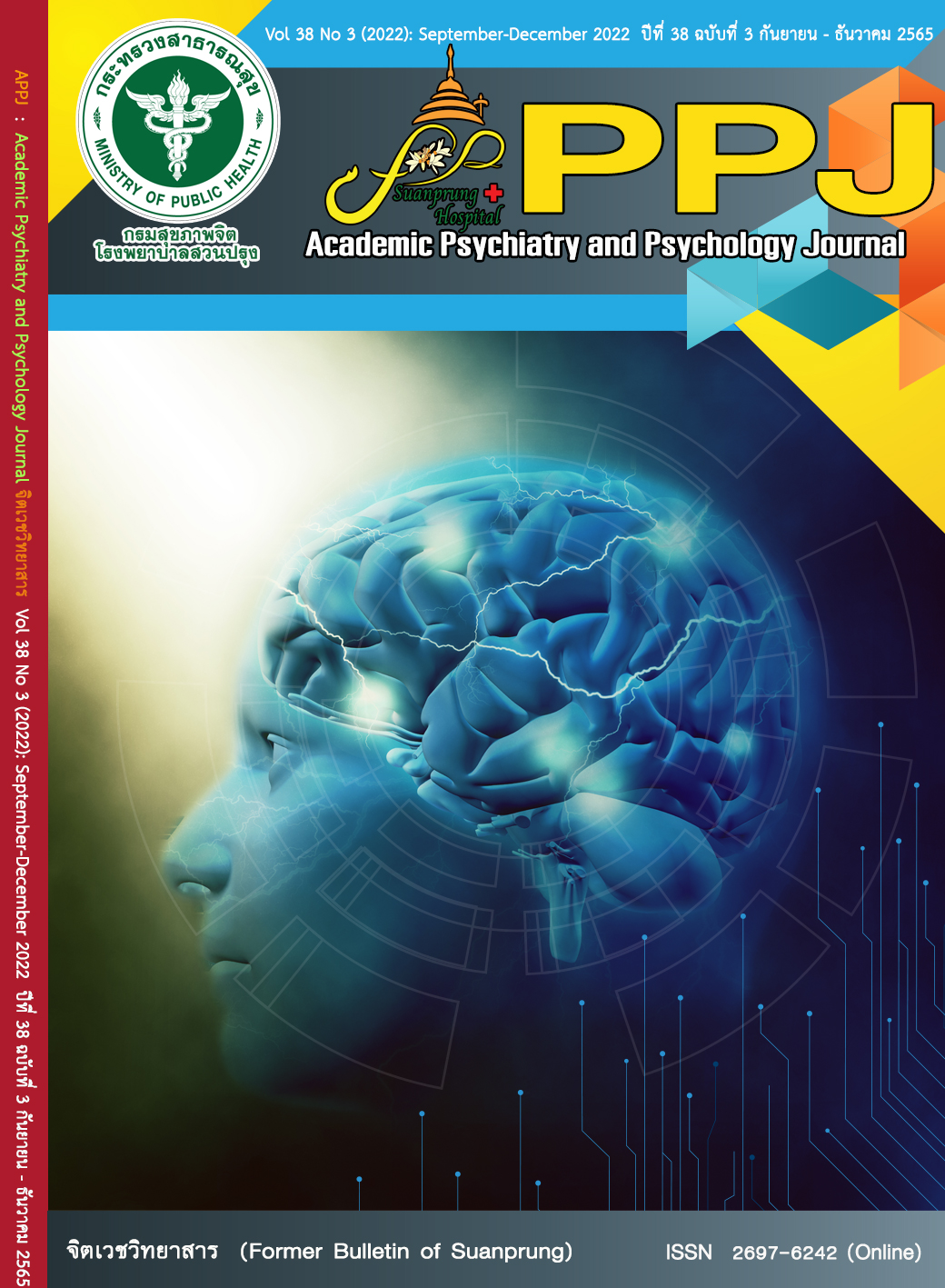Evaluation of the Nursing Specialty Program in Mental Health and Psychiatric Nursing 1st Hybrid program of the Department of Mental Health
Main Article Content
Abstract
.
Objective: Our research aimed to evaluate the Nursing Specialty Program in mental health and psychiatric nursing, the 1st hybrid program of the Department of Mental Health. The evaluation of performed using Kirkpatrick model. The model comprised the evaluation behavior and results, and factors that affect the graduates’ application of knowledge after the training.
Methods: Evaluation Research was evaluated by 82 graduates of nursing specialty in mental health and psychiatric nursing, the 1st Hybrid program of the Department of Mental Health, and 55 superiors. A questionnaire was developed by the researchers. It included general information, nursing practice behavior after the training, and the successful results of the organization from the performance of the trainees. Content validity was approved by 5 experts, and every question’s Item-Objective Congruence Index (IOC) was 0.8. Data were analyzed as mean and standard deviation, percent, and categorizing data.
Results: Graduates and their superiors have the following opinions: graduates changed their nursing practice behavior after the training, and they always apply the knowledge gained in health promotion, prevention, treatment, rehabilitation, and improving the quality of patient care. However, they sometimes engaged in research and innovation. In terms of results, it was found that nursing practice has been developed. In addition, they have improved the quality of work, research, and network coordination and developed mental health teams and mental health systems in their organization. In terms of factors that affect the activeness of the training, there are five factors that affect the participants’ ability to apply the knowledge from training to work. All informants agree that organizational policy, superiors’ support, co-workers’ support, network support, and self-determination all affect their ability to apply the gained knowledge to their work directly.
Conclusions: After completing the training for 6 months, the graduates had a change in nursing practice behavior for the better and were able to apply the knowledge to practical work. However, there should be follow-ups regarding behavior and evaluation of the academic achievements. Research and innovation can improve the academic quality of organizations on a long-term basis.
Article Details

This work is licensed under a Creative Commons Attribution-NonCommercial-NoDerivatives 4.0 International License.
บทความหลังผ่านการปรับแก้จากกองบรรณาธิการแล้ว เป็นลิขสิทธ์ของวารสารจิตเวชวิทยาสาร โรงพยาบาลสวนปรุง กรมสุขภาพจิต กระทรวงสาธารณสุข ห้ามเผยแพร่เพื่อประโยชน์ทางการค้าโดยไม่ได้รับอนุญาต แต่อนุญาตให้เผยแพร่บทความดังกล่าวเพื่อประโยชน์ทางการศึกษาแก่ประชาชนทั่วไป ทั้งนี้กองบรรณาธิการไม่จำเป็นต้องเห็นด้วยกับบทความหรือข้อคิดเห็นใดๆ ที่ปรากฏในวารสารสวนปรุง
References
Ministry of public health. The Ministry of Public Health's policy-driven plan for the year 2022 [Internet].2022 [cited 2022 Apr 2]. Available from https://apps.hpc.go.th/dl/web/upFile/2021/11-1018-20211111142542/9a2ac8c61e4dc42f6100bc575998acc0.pdf. (in Thai)
Thanadechawat N, Sadaenghan P Ingard A. Behavioral Assessment from Kirkpatrick Evaluation Concept The Case of Digital Leader Training Project. Burapha Journal of Business Management [Internet].2022 [cited 2022 Apr 2]. Available from http://ojslib3.buu.in.th/index.php/business/article/view/5858
Puvitayaphan A. Competency-based training needs analysis. Bangkok : H R center
; 2013.
Faculty of Education, Chula University. Project evaluation [Internet].2022 [cited 2022 Apr 1]. Available from http://km.moi.go.th/km/32_quality_plan/evaluate/evaluate5_4.pdf (in Thai)
Department of Mental Health. Training manual for Program of Nursing Specialty
in Mental Health and Psychiatric Nursing 1st Hybrid program of Department of Mental Health. Nonthaburi: Department of Mental Health; 2021. (in Thai)
Vibulwong P, Chaiyasup V, Chosiwasakul K. A Follow-up and Competency Evaluation of Nurse Practitioners Curriculum (Primary Medical Care): Comparison of Opinions between Nurse Practitioner Graduates and Supervisors at Boromarajonani College of Nursing, Bangkok. Journal of Boromarajonani College of Nursing [Internet].2022 [cited 2022 Apr 2]. Available from https://he01.tci-thaijo.org/index.php/bcnbangkok/article/view/28928/24881
Muangjaroen Y, Meechan S. Evaluation of the residency training program of the department of pediatrics,Faculty of medicine ramathibodi hospital. Veridian E-Journal, Silpakorn University [Internet].2022 [cited 2022 Apr 2]. Available from
https://he02.tci-thaijo.org/index.php/Veridian-E-Journal/article/view/39339
Chakesaengrat K. Human resource management. Bangkok : Ramkhamhaeng University; 2010. (in Thai)
Medical education center, Regional Health Promotion Center 5 Ratchaburi. Evaluation of the training workshop applied research in public health officials Ratchaburi Provincial Public Health Office [Internet]. 2022 [cited 2022 Apr 1]. Available from https://hpc.go.th/km/training/selfstudy/research.pdf

